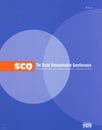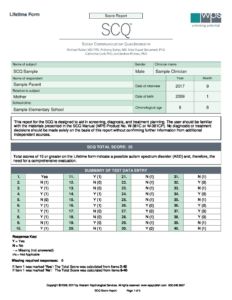
Social Communication Questionnaire scq
For: Offers a quick, easy, and inexpensive way to routinely screen for autism spectrum disorders
Reading Level: Over age 4 years, with a mental age over 2 years
Format: Paper-and-Pencil, PC Based Software, Online administration in WPS Online Evaluation System
Length: Less than 10 minutes
Scoring: Hand Scored; Computer Scored, Online Scored and Report generated
Printed Manuals
Physical printed manuals.
Printed Kits
Click to browse products
Online Forms, Reports, Kits & e-Manuals
All online resources including Forms, Reports, i-Admins, Kits and e-Manuals.
PC Software
Click to browse products
Printed Forms & Handscoring Materials
Test forms, response booklets and scoring reference manuals.
SCQ Manual
SCQ Online Manual
SCQ Kit
SCQ Online Kit
SCQ Current Online Form (20 Uses)
SCQ Lifetime Online Form (20 uses)
SCQ Unlimited-use Scoring CD-ROM
SCQ Current Autoscore Form (20)
SCQ Lifetime Autoscore Form (20)
Sample Reports
Author
Michael Rutter, M.D., FRS, Anthony Bailey, M.D., and Catherine Lord, Ph.D.
Description
Previously known as the Autism Screening Questionnaire (ASQ), this brief instrument helps evaluate communication skills and social functioning in children who may have autism or autism spectrum disorders. Completed by a parent or other primary caregiver in less than 10 minutes, the SCQ is a cost-effective way to determine whether an individual should be referred for a complete diagnostic evaluation.
The questionnaire may be used to evaluate anyone over age 4 years, as long as their mental age exceeds 2 years. It is available in two forms (Lifetime and Current), each composed of just 40 yes or no questions. Both forms may be given directly to the parent, who may answer the questions without supervision.
The Lifetime Form focuses on the child’s entire developmental history, providing a Total Score that’s interpreted in relation to specific cut-off points. This score identifies individuals who may have autism and should be referred for a more complete evaluation – with the Autism Diagnostic Interview-Revised (ADI-R) or the Autism Diagnostic Observation Schedule (ADOS) for example. SCQ content parallels that of the ADI-R, and the agreement between SCQ and ADI-R scores is high and substantially unaffected by age, gender, language level and performance IQ. This indicates that the SCQ is a valid screener, providing a reasonable picture of symptom severity.
Moving from developmental history to present status, the Current Form looks at the child’s behaviour over the most recent three month period. It produces results that may be helpful in treatment planning, educational intervention and measurement of change over time.
In addition to its screening and educational applications, the SCQ may also be used to compare symptom levels across various groups, (e.g. children with developmental language disorders), or youngsters with medical conditions typically associated with autism spectrum disorders. Because the SCQ is brief, quick, easily administered and relatively inexpensive, it allows clinicians and educators to routinely screen children for autism spectrum disorders. This in turn permits early intervention.
NB: Prices are in Australian dollars inclusive of GST. NZ customers need to log in to view ex-GST prices.
 NZ
NZ





